| Instrumentation | VERSION 1: Chamber Orch: fl,cl,ob,bsn,2hn,tp,tb,acc,mand.,harp,2 perc, strings, choir, 5 sop, mezzo,tenor, baritone VERSION 2: Symphony Orch: 3/3/3/3 4,3,3,1,mand.,harp,3 perc, strings,choir, 5 sop, mezzo,tenor, baritone | ||||||||||||||||||||||||||||||
| Duration | 1 hour | ||||||||||||||||||||||||||||||
| World Premiere | Fisher Center, Sosnoff Theater, Bard College, NY, 22 March 08 | ||||||||||||||||||||||||||||||
| Commission | Commissioned by Graduate Program in Vocal Arts of The Bard College Conservatory of Music | ||||||||||||||||||||||||||||||
| Awards | Finalist in the 2009 National Opera Association Competition. Selected for New York City Opera's prestigious VOX Festival 2009 | ||||||||||||||||||||||||||||||
| Reviews | 5 Reviews"The last work showcased was by far the best... The music, rich with imagined folk tunes, undulant accompaniment patterns and vibrant choral writing, is delicate, tartly tonal and lucidly orchestrated" | ||||||||||||||||||||||||||||||
| Text | Alasdair Middleton, based on the Russian folk tale 'The Language of the Birds'. | ||||||||||||||||||||||||||||||
| Recording | |||||||||||||||||||||||||||||||
| |||||||||||||||||||||||||||||||
| Video |
Bard College Orchestra & Choir, conducted by James Bagwell, Yulia Van Doren soprano (Bird with Golden Plumage), Sungeun Lee tenor (Ivan), Yohan Yi Baritone (Merchant, Captain, King), Chanel Wood Soprano (Nightingale), Rie Miyake Soprano (Princess), Kristin Ezell Soprano, Melissa Wegner Soprano, and Tania Rodriguez Mezzo-Soprano (Narrators). . Complete first performance available on request |
||||||||||||||||||||||||||||||
Other photos, from DVD stills: 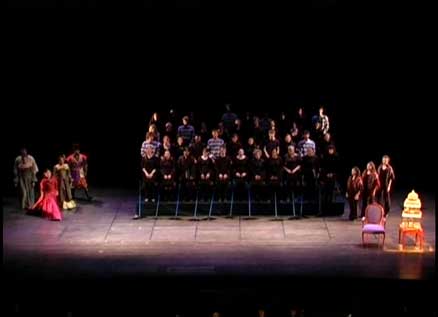 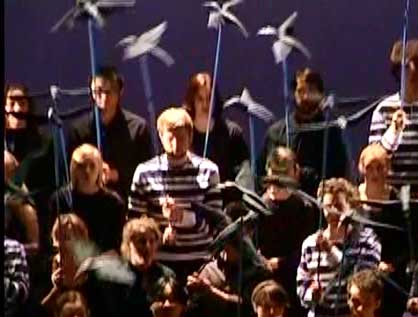 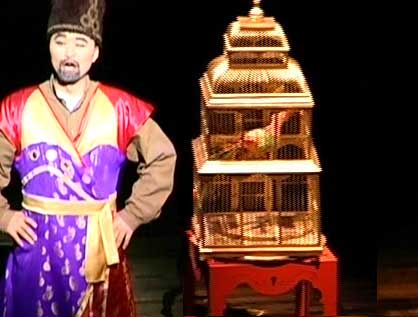 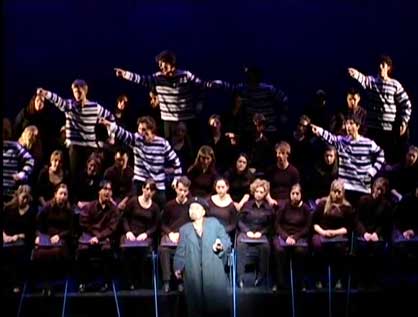 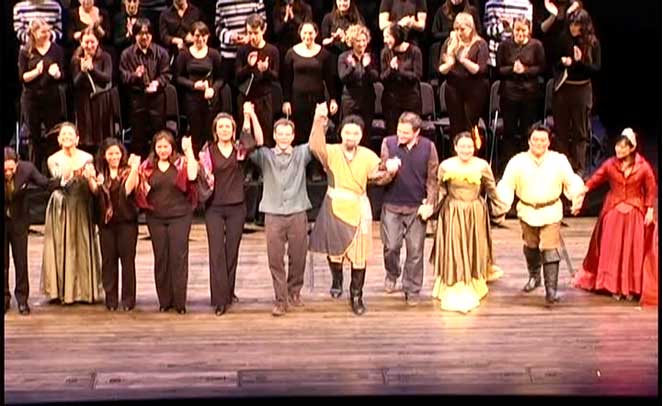 | |||||||||||||||||||||||||||||||
Programme Note "The Language of the Birds" is an old Russian Folk Tale I found in the collection ‘Folk Tales from the Russian’ by the wonderfully-named Verra Xenophontovna Kalamatiano de Blumenthal, published originally in 1903. The story is similar in essence to the biblical story of Joseph and his ‘coat of many colours’, but with an Ivan in place of a Joseph, and the action taking place in ‘Holy Russia’ (the Egypt of the Joseph story here becomes an unnamed foreign land of ‘minarets and domes’). The Russian story retains the central theme of the Joseph story – that of the poignant compassion and forgiveness of the heroic son, who forgives the family members who have betrayed him, but ‘Birds’ adds a whole extra and equally important layer to the moral and message of the story – that compassion and attention should just as equally be afforded to nature as to man. I was thrilled to be offered the chance to write this piece for members of Bard’s vocal faculty, whom I got to know in 2006 and 2007 when myself and seven other composers worked with them on new vocal commissions from Carnegie Hall under the mentorship of Osvaldo Golijov and Bard’s own Dawn Upshaw. The process of this piece has been proof to me of the need for deadlines, as I had been struggling with a deadline-free ‘development commission’ from the Royal Opera House’s ROH2 in London and had spent over a year with three different librettists trying to find a way forward (that commission remains to be completed!). When Dawn Upshaw rang in early September 2007 and offered me the chance to write an hour-long piece with 8 soloists, orchestra and choir, on the condition that it was completed by the end of December, something just told me that this impossible task was the right thing to do. As I write, just a couple of days after completing the full score, it now feels like what I have written is in fact the piece I was struggling so unsuccessfully to write for the Royal Opera people, and strangely, I didn’t even feel particularly rushed! A few weeks before Dawn phoned, I had worked with librettist Alasdair Middleton on a small opera project for London’s Opera Group, to be sung to shoppers in Oxford Street’s famous Selfridges department store. During development workshops for the project, Alasdair had impressed me by producing a polished five-minute libretto, literally from scratch, in the space of two hours. I knew he was the man for this Bard commission. I also knew that given the time constraints we would be wisest to work with an existing story, hence my scurrying off into the archives of folk literature. When I found the Language of the Birds story, it shone out to me on so many levels. I loved its environmental and compassionate message; the multiple chances it offered to use the music of birdsong; the varied scenarios of sailors and Princesses; and perhaps even the chance to put on a musical ‘Russian accent’. After the Carnegie commission, which had turned out to be a series of short folk songs (based on Polish and other Eastern European folk influences), I knew I wanted this piece to be made up of ‘numbers’ in some sense. I have always aimed for clarity of form as a priority, and splitting a longer work up into short, distinct musical sections has helped me to achieve this in recent pieces. But I was still unclear as to exactly what genre the piece would fall into. I knew I wanted an element of narration, so that the piece could in theory be presented in concert format as well as on the stage, and my initial idea was that it would be something like Bach’s Matthew Passion, consisting of recitatives and arias, although the clumsy labels of ‘dramatic cantata’ or ‘dramatic secular oratorio’ always felt inappropriate. So I sent Alasdair away with the folk tale, and this vague notion of an oratorio-like structure and in an astonishing 10 days or so he produced a trully wondeful libretto which enriched the two-paged story I had sent him immeasurably, and showed supreme tact in dealing with some of the story’s more pantomime elements (the pirates remain safely on the distant horizon!) What sets Alasdair’s libretto apart, however, from the kind of aria-recitatve style of a Bach oratorio is the way the characters join with the narrators in telling the story about themselves – thus, the merchant introduces himself “I was a merchant, I had wealth and healthy son and heir” and so on, describing what happened in the past tense, even as he goes about his role within the progressing drama. What this creates is a kind of stylized story-telling, which, as director Doug Fitch marvellously wrote in an email to me recently, “does not really require ‘acting’ but more of a collective effort to create an imaginary landscape (or mindscape) that invites us to project our own imaginations onto [the characters’] otherwise very abstracted actions.” Most of the narrated sections of the libretto fall into strictly-metered and rhymed stanzas; the characters often speak in rhyme too, but they tend to break free of the rhythmic structure and go their own way, almost as if they are getting caught up in their own story-telling, even breaking into present-tense conversations with each other from time to time. Nevertheless, narrator and character here are closer together in style than is traditionally the case, so I decided not to completely separate the two, but instead run them into one another. There are still oratorio-like musical ‘numbers’, but the feeling of ‘aria’ and ‘recitative’, of narration and reflection, becomes more intermingled. One distinction I did make was in the kind of vocal lines to give the narrators – in my mind they became fierce old Russian peasant ladies telling us this moral tale for our own good, and they therefore inhabit a kind of imaginary Russian musical style, which draws liberally on traditional Russian folk music. The nightingale too, I think because she is the other grounded, ‘morally-aware’ character, is a distinctly Russian-sounding bird (her opening aria is in fact a real folk melody, albeit to a distinctly untraditional accompaniament.) The piece ends, as it begins, with all the singers on stage, in a ‘village chorus’ of sorts, and in the manner of Stravinsky’s Rakes Progress, we are sent on our way with a moral to ponder – that’s it’s “not what you say, but what you hear – wisdom lodges in the ear” and that the most important lesson the nightingale has to teach us can be spoken in a single word: “Listen”. David Bruce Jan 08 SynopsisSOMEWHERE in a town in holy Russia, there lived a rich merchant with his wife. He had an only son, a dear, bright, and brave boy called Ivan. Near the window in their home hung a cage, and a nightingale, a sweet-voiced, gray bird, was imprisoned within. The sweet nightingale began to sing its wonderful song with trills and high silvery tones. Ivan listened intently to the song and asked his father what the bird was saying. ‘It doesn’t mean anything’ replied his father brusquely.But Ivan was puzzled and no matter where he was, no matter what he did, he always thought of how he could learn the language of the birds. Some time after this Ivan was out walking in the wood. The winds rose, the sky became clouded, the lightning flashed, the thunder roared loudly, and the rain fell in torrents. Ivan soon came near a large tree and saw a big nest in the branches. Four small birds were in the nest; they were quite alone, and neither father nor mother was there to protect them from the cold and wet. The good Ivan pitied them, climbed the tree and covered the little ones with his coat. The thunderstorm passed by and a big bird came flying and sat down on a branch near the nest and spoke very kindly to Ivan. "Ivan, I bless you, you protected my little children from the cold and rain and I wish to do something for you. Whatever you wish for, ask of me" “I want to know The Language of the birds” Ivan answered. And as he said this the forest started to rustle and all the birds of the air assembled there and began to sing. And each bird placed its beak in Ivan’s ear. “I understand! I undestand!” Ivan exclaimed, ”their song is as clear as words- I understand the language of the birds” Ivan hurried back to his home, and heard the nightingale singing in the cage. His song was so sad, however, that the merchant also became sad, but Ivan, who listened very attentively to the bird understood what it said and was terrified. "Dear father," said Ivan, "Did you not hear? The nightingale says: 'The time will come when Ivan, the merchant's son, shall become Ivan, the king's son, and his own father shall fall on his knees and beg him for charity.'" The merchant felt troubled and began to distrust his son, his good Ivan. So one night he gave him a drowsy drink, and when he had fallen asleep he took him to a boat on the wide sea, spread the white sails, and pushed the boat from the shore. For a long time the boat danced on the waves and finally it came near a large merchant vessel, which struck against it with such a shock that Ivan awoke. The crew on the large vessel saw Ivan and pitied him. So they decided to take him along with them. High above in the sky they perceived cranes. Ivan said to the sailors: "Be careful; I hear the birds predicting a storm. Let us enter a harbour or we shall suffer great danger and damage. " But no one paid any attention and they carried on. In a short time the storm arose, the wind tore the vessel almost to pieces. Later, when a flock of wild swans flew above them and talked very loudly among themselves, Ivan told the sailors "Be careful, there swans say there are pirates nearby, we must go to the safety of a harbour”. The crew quickly obeyed this time and as soon as the vessel entered the harbour the pirate boats passed by and the merchants saw them capture and plunder several unprepared vessels. When the danger was over, Ivan said goodbye to the sailors and set out to explore the great city where the boat had harboured. A King ruled in that town who was very much annoyed by black ravens. All the time the ravens were perching near the window of the king's chamber. No one knew how to get rid of them. The king ordered notices to be placed on the palace gates, saying that whoever was able to relieve the king from the noisy birds would be rewarded by obtaining the youngest Korolevna, the king's daughter, for a wife; so Ivan listened to what the Ravens were saying and then went to the palace and told the king: "The Raven’s are unsure where to fly – the mother ravens think they should go to the East, the father ravens think the West, and the sons can’t decide. They want the King to decide. The king answered: "The son raven must follow the father raven." The ravens all accepted the royal decision - off they flew and no one has heard the noisy birds since. The king gave one-half of his kingdom and his youngest Korolevna to Ivan, and a happy life began for him. In the meantime his father, the rich merchant, lost his wife and by and by his fortune also. One day in frustration he threw the bird cage to the floor and the nightingale escaped, leaving him with nothing. So the old man went begging under the windows of charitable people. He went from one window to another, from one town to another, and one day he came to the palace where Ivan lived, begging humbly for charity. Ivan saw him and, still not recognizing him, ordered him to come inside, and gave him food to eat and also supplied him with good clothes. But the old man wept. "Why do you still weep?" asked Ivan "Because I cannot understand your kindness," answered the poor father. At that moment the nightingale flew in through the window and spoke to Ivan and his father, so they each realised who was standing in front of them, and that everything had happened as the bird had predicted. The old man was frightened and knelt before his son, but his Ivan remained the same good son as before, took his father lovingly into his arms, and together they wept over their sorrow. And when the people heard what had happened they too wanted to understand the language of the birds. And above their heads the nightingale sang “Listen! Listen!” and flew away. | |||||||||||||||||||||||||||||||

|
Recent news items |
Most popular posts |
All works are available through billholabmusic.com. |